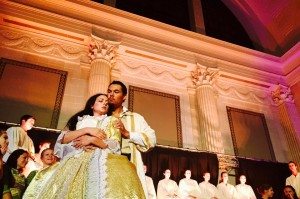A Trustworthy Guide to Opera
Dido and Aeneas share a final embrace as the fates gaze unmoved
Happy Saturday, friends! Autumn is finally here and it’s been great to see so much activity in Lancaster on this chilly October morning!
This past Thursday I had the opportunity to experience my very first opera at OperaLancaster’s pay-what-you-will final dress rehearsal. I had no idea what to expect and I wasn’t fully sure if I would like it, but I was excited to give it a try. Am I ever glad I did! This collaboration between OperaLancaster, members of the Lancaster Symphony Orchestra, the Lancaster Bible College Chamber Singers, and The Trust was truly unbelievable. As it turned out, I wasn’t the only rookie in the audience as many others admitted to being novices at the start of the program. I thought it might be beneficial for others who are new to opera who may attend tomorrow evening (October 4th) or next week (October 11th) to write a quick review of what I learned Thursday evening.
So! From one opera newbie to another, here are some things I found helpful for my first trip to the opera:
1) Get a program – and read it!
Opera isn’t what plays from my radio on a regular basis (or ever, really) and so it was sometimes difficult for me to understand the words because my ears weren’t accustomed to the style. The story is absolutely central to the opera experience and it’s easy to get lost if you’re unfamiliar with the storyline. Included in the program is a scene-by-scene synopsis to help you keep up with the action and interpret the unfamiliar style. It’s kind of like reading the cliff notes to Shakespeare as you’re reading Shakespeare. Get a program – and read it!
2) Expect symbolism
Symbolism is a storytelling tool that is often neglected in modern entertainment. Not so in opera! Set pieces, costuming, and sometimes entire characters themselves are carefully chosen to communicate details and moods or to foreshadow. Anticipating symbolism helped me to know when to read between the lines and make connections I would have missed had I not been looking for them. Dido and Aeneas is rich with symbols, so be on the lookout!
3) Relax and enjoy the show!
I’ll admit – the show put me a little bit out of my comfort zone. I found myself being so wrapped up in understanding the show that I would forget to appreciate a humorous line, ironic scenario, or incredible vocal performance. Dido and Aeneas is a tragic story, but there is so much to discover and enjoy. Take a minute to read the synopsis and then relax and watch it all unfold. You may not get every word or jab, but you will be in for a highly enjoyable (thought heart-wrenching) experience.
BONUS: (because there always has to be a bonus!) Turns out, it’s okay to clap! In a classical piece where there are several movements, correct courtesy is to hold your applause for the end of the entire work and not to applaud between movements. I assumed this would be the case for opera but it is not. Take cues from those around you and don’t be shy about joining in!
Overall, I thoroughly enjoyed Dido and Aeneas – even more than I thought I would! The set is gorgeous, the acting is delightful, the story is gripping, and the voices are absolutely unbelievable. I’m so glad I saw it! A hero and his queen, cupid’s arrow, an evil witch’s devious plan, heartless fates, love and heartache – all in an hour and a half! What’s not to love? For all my fellow opera newbies: don’t be afraid to give Dido and Aeneas a chance. I loved it, and I have a feeling you will too.
